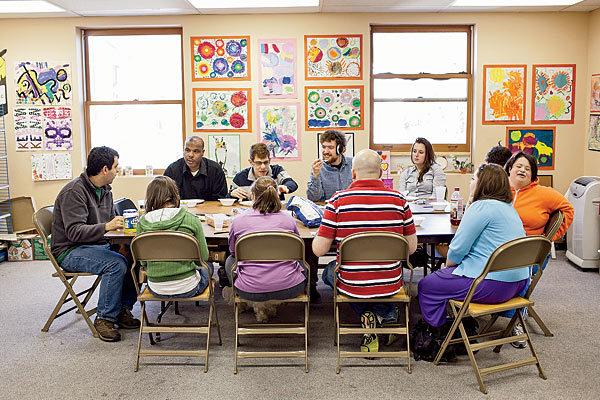
Lunchtime at Our Place
The peas must be sorted. On a recent Friday morning, several 20-something volunteers buzz around a North Shore basement that houses a food pantry for the needy. Pouya Bagherian, an outgoing young man who is prone to mistakenly throwing valuables into the trash, goes through bags of donations. Jason Kaplan, a quiet type who is most comfortable plugged into his iPod, checks each can of peas to make sure it has no puncture marks. And Frank Craven, who is slight and wears thick-rimmed glasses, organizes the cans on a shelf so that the earliest expiration dates are in front.
These tasks require an enthusiasm for repetition that many people would find mind numbing. Not these three. Bagherian and Kaplan, both 26, are autistic; Craven, also 26, has a rare autism-like condition called Lowe syndrome. Coming here lets them build real-world skills such as organization and teamwork, plus earn the satisfaction of a job well done. Equally important, it gives them a reason to get up in the morning.
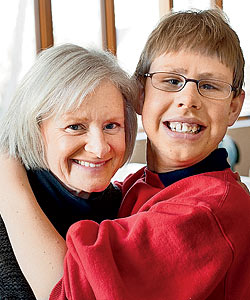
Jane Gallery and son Frank Craven at Wilmette’s Our Place program, which she founded
Many autistic adults have a hard time finding their place in the world. Less than half enroll in higher education or find work. (According to the Social Security Administration, only about 6 percent of adults with autism work full-time.) Many lack the skills to live alone. Those who cannot work generally qualify for monthly Social Security disability payments, which are too low to cover vocational coaches, therapeutic day programs, or other interventions that may help an autistic person reach a modicum of self-sufficiency. Meanwhile, the federal government does not require school systems to provide special education for students older than 18 (most states, including Illinois, have extended the requirement through age 21). “If you have a developmental disability like Frank, when you turn 22, you disappear,” says Craven’s mother, Jane Gallery, a 61-year-old Winnetka resident. “You fall off a cliff.”
Despite the countless news reports about the meteoric rise of autism-spectrum diagnoses (1 in 88 American children today vs. 1 in 150 in 2000) and the myriad books and websites about raising youngsters who have this developmental disorder, there is little discussion of or planning for what those kids are to do when they are no longer kids. An estimated 300,000 of them are expected to hit adulthood in the next decade (see “A Looming Tsunami”). Their fate is an increasingly urgent social problem, especially in Illinois, where the state budget is under immense pressure. “I’m very concerned,” says Kevin Casey, appointed by Governor Quinn in 2011 to overhaul the state’s Division of Developmental Disabilities. “There are not enough services for everyone. If we don’t get the pension crisis solved, it’s going to get worse before it gets better.”
Frank Craven’s postteen experience illustrates the problem. After finishing high school at New Trier in 2005, where he took a mix of regular and individualized classes, he began attending a publicly funded life-skills and job preparation program run by a consortium of North Shore school systems. Four years later, when his 22nd birthday arrived, he got a Friday afternoon sendoff party with pizza and cupcakes. And then he went home. That next Monday was what parents sometimes refer to as as the Day the Bus Does Not Come.
His mother, Gallery, the former owner of a food store and catering company, and father, Buz Craven, a corporate tax attorney, spent the months leading up to their son’s birthday combing Chicago’s North Side and North Shore. Their goal: find a day program that would (a) get their son off the couch and keep him happy and engaged and (b) meet his physical needs, such as insulin monitoring. (Frank’s condition affects not only cognitive functioning but also metabolism, muscle development, and vision.)
The couple found very few programs that met the first requirement and none that met both. One reason for the scarcity is that “research hasn’t focused on the needs of these adults, and it hasn’t focused on interventions [for them],” says Jennifer Gorski, a professor at the University of Illinois at Chicago who runs a local training center for the state-funded Autism Program of Illinois. Many existing day programs for autistic adults, parents charge, amount to little more than warehouses.
Afraid that Frank would languish in front of the television, gain weight, and grow more depressed by the day, Gallery finally threw up her hands and did the only thing she could think of. She started her own program. Called Our Place, it provides a range of constructive activities—such as organizing that food pantry—five days a week for some 50 adults with autism and other developmental disabilities.
Turns out that Gallery is in the vanguard of a pioneering group of parents and grandparents. Frustrated by the current options and more than a little worried about the future of their loved ones, they’re rolling up their sleeves and creating their own solutions. For example, Forest Park resident Debra Vines, a former hairstylist, is focused on building a community that will help get autistic adults out of hiding; retired CEO Terry Kline recently started a west suburban version of Our Place.
While they have a tough road ahead, says Katy Neas, a Washington, D.C.-based disability rights lobbyist for the charity Easter Seals, it is people like these who will ultimately upend the current system of care for developmentally disabled adults. “It is because of them that we are even as far along as a country as we are,” Neas says. “The dedication of these families to each other has made a world of difference.”
* * *
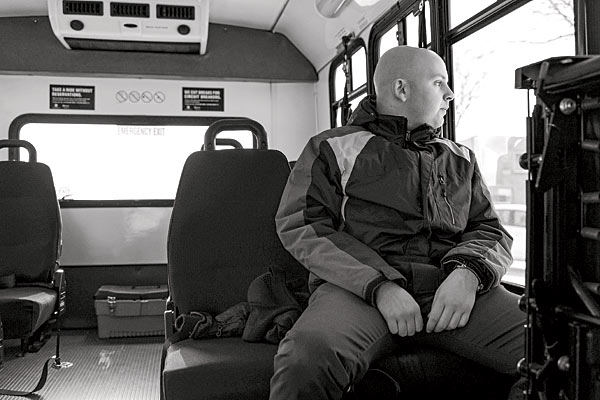
Josh Stern, 24, who is autistic, rides a Pace paratransit bus to his job at a North Shore bank.
Though it is now more prevalent among American children than AIDS, cancer, and diabetes combined, autism is still largely a mystery. People with the condition (autism is five times more common in boys than girls) typically struggle with social interaction, communication, and speech; they often suffer from other cognitive, psychiatric, and neurological difficulties too. Many are prone to repetitive behaviors, obsessive-compulsive tendencies, withdrawal, or tantrums. Although there is no known cure, a regimen of interventional therapies has been shown to help, especially if started early.
And so begins an emotionally grueling and costly cycle that parents of Our Place participants know all too well: years of intensive speech, occupational, and play therapy that augment the child’s regular school day. “I was driving all over Chicago to take Josh to his appointments,” recalls Wilmette resident Linda Stern, referring to her autistic son, now 24.
Sometimes that investment yields significant results. Like Frank Craven, Josh Stern attended New Trier, where he excelled at math, and went on to the area’s life-skills program. A counselor helped him land a part-time job in a suburban bank before he turned 22. There he uses his photographic memory to help match vehicle identification numbers with car loan paperwork. In three years on the job, he has not once called in sick. Stern earns $8.25 an hour, more than many autistic workers (a loophole in the federal Fair Labor Standards Act allows employers to pay the disabled below minmum wage). “We’re very fortunate,” says his mother. “The people at the bank have really taken ownership of him. And he feels important.”
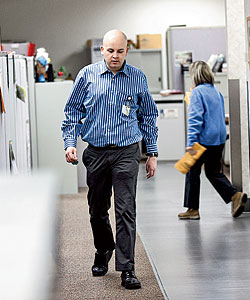
Josh Stern at his bank job
Gallery knew that her son would probably never be high-functioning enough to hold a job like Stern’s. But she believed that it was crucial for him and other developmentally disabled people to keep building practical life skills, learn to curtail counterproductive behavior, serve the community in a visible way, and—most of all—make friends with other people around their age. “I wanted to create a place with meaning and purpose,” Gallery says. “A place that accommodates different levels of skills. A place that makes work feel rewarding. A place where Frank could build relationships.”
Did other parents feel the same way? Gallery decided to gauge interest by passing a sign-up sheet around the bleachers at a Special Olympics basketball tournament. “I got 30 signatures in one day,” she says.
An information session in 2008 in a Wilmette Park District rec room spawned a series of Saturday night potluck socials for potential participants. A nucleus of 20 families emerged, each of whom gave Gallery $100—enough for her to file for nonprofit status and get insurance.
Early on, one of the most vexing questions Gallery faced was whether to seek public funding for Our Place. That would mean wading into a maze of differing local, state, and federal rules and regulations. “The more you look into these sorts of things, the more you realize there are roadblocks everywhere,” she says.
Figuring that meeting state licensing requirements could hold up Our Place for more than a year, Gallery decided not to apply for state or federal support. Instead, she petitioned New Trier
Township administrators for a community grant. They awarded her $20,000 (and have granted her as much as $65,000 each year since)—enough to hire an energetic program director, 29-year-old Stacia Swan, who has a background in special education and case management. Gallery signed a lease for space at a Wilmette church.
She was committed to keeping the cost of attending Our Place reasonable. Rather than the $85 or so a day that she says most programs in the area charged, Gallery set day fees at $55, or $8.50 an hour. (Participants may attend in anything from three-hour increments to full nine-hour days.)
In October 2009, when Our Place opened, 26 developmentally disabled teens and adults had signed up. By 2011, there were 40. Gallery then hired an executive director—William Johnson, 51, an affable ex–Aon executive—to manage daily operations and fundraising. (Fees cover 40 percent of the budget; the rest comes from grants and donations.)
Swan anchors each day around volunteer tasks in the morning and other group activities in the afternoon. The Our Place volunteers work at the New Trier Township Food Pantry, the Mitchell
Museum of the American Indian in Evanston, or the Winnetka Thrift Shop. “Many of the tasks involve organization, which our guys are good at,” says
Johnson. “It’s an opportunity for them to be useful and do something they enjoy.”
Swan views lunchtime as a prime opportunity to reinforce life skills. So Our Place participants help shop for groceries, make the meals, and clean up. Lunch is also an excellent time for conversation practice. On a recent day, the young people gathered around the dining table at the light-filled program headquarters are good-naturedly ribbing Jason Kaplan about his weekend plans.
“What about your girlfriend? Are you bringing her to the social this weekend?” one man asks.
“She’s my friend, not my girlfriend,” Kaplan answers, his eyes closed. “She’s still giving it some time.”
“We’d like to meet her,” another insists.
Kaplan sighs. His eyes open. “We’re still getting to know each other.”
Not every exchange is so calm. One usually charming 25-year-old occasionally has a frustrated outburst. The staff has given him a color-coded key chain: green signals happy, red angry, and yellow in between. He flashes yellow to show when he’s feeling agitated and needs to take a break. “I am also working on saying ‘excuse me’ before interrupting,” he says, after jubilantly, well, interrupting.
Recently, Gallery has begun hoping that a few members of Our Place could take another step toward self-sufficiency and become roommates. After all, research shows that both autistic adults and their families are happier when the former live in the community, either with a friend, with a spouse, or in a group home with fewer than six people. “When you’re interacting with your neighbors,” explains Mary Kay Rizzolo, the associate director of the Department of Disability and Human Development at the University of Illinois at Chicago, “you make friends. You have more employment opportunities. You learn self-advocacy.”
But Gallery knows that the goal of moving an autistic adult child to a small group home can be an elusive one. That’s partly because the state of Illinois hasn’t provided much funding for such homes. The vast majority of the roughly 150,000 Illinoisans with developmental disabilities live with relatives. In 2009, only 38 percent of the remainder lived in a small group setting—the lowest percentage in the nation except for Mississippi.
The rest lived in nursing homes or in Illinois’s big institutions for the mentally disabled, seven of which are state run. Even as institutionalization gradually fell out of favor nationally, the Illinois government, until recently, kept giving more money to institutions than to community-based group homes or to families who wanted to keep their loved ones living with them. That’s puzzling, given that the latter two options are far less expensive: Illinois spends $57,000 to $182,000 a year in state and matching federal dollars to institutionalize a developmentally disabled person vs. an average of $45,000 to pay for a small group arrangement or $19,000 to cover assistance at home.
But the terrain is shifting. In 2011, Illinois settled a class-action lawsuit brought by the Chicago-based advocacy group Equip for Equality. As a result of the consent decree, the state has begun funneling more resources to disabled individuals or their guardians—to the tune of $33.5 million in 2013. (Illinois has also closed the Jacksonville Developmental Center and started the process of closing other larger state-owned institutions.) They, in turn, are supposed to have the option of using that money to pay for things like day programs or vocational training—or for spots in group homes, if they can find them. Says Tony Paulauski, executive director of the Arc of Illinois, a grassroots advocacy organization: “Now the issue is: Are there enough places for people to go?”
* * *
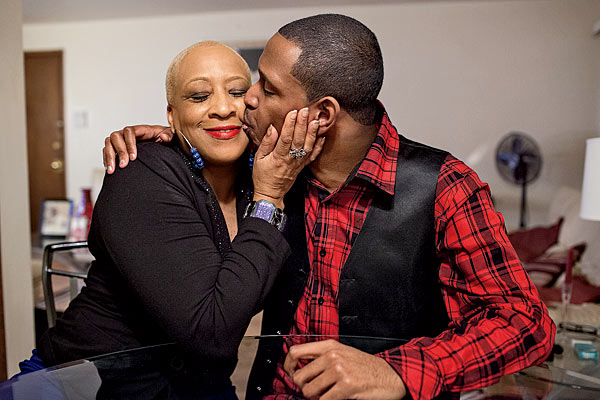
Debra Vines, founder of support group The Answer, Inc., with her son, Jason Harlan, at their Forest Park home
Jane Gallery was fortunate: on the North Shore she found a supportive community of parents of other developmentally disabled adults, all of whom were committed to getting their children out of the house and into the real world. But on the West Side of Chicago, in the predominantly African American community of Austin, Debra Vines and her family felt alone.
When Vines’s younger son Jason, now 25, was first diagnosed with autism, she says, she found that special education programs and interventional therapies were virtually nonexistent in the neighborhood. Vines began taking the youngster by train to therapy sessions on the North Shore and in Aurora. She recalls being amazed at seeing so many disabled people out and about. “I remember saying, ‘Jason cannot be the only black person with autism!’ ”
When Jason was eight, Vines and her husband, James Harlan, a security officer, moved the family to the near western suburb of Broadview so their son could enroll in a public school with a stronger special-needs program. (They have since moved to nearby Forest Park.) Vines says that other parents there began marveling at how much information she had gathered about raising an autistic child.
Soon her phone number was being passed around, and strangers with autistic kids of their own were calling to ask for advice on everything from applying for government support to dealing with autism-related financial and marital stress. “There were national agencies starting at the time, but there was a real grassroots need,” she recalls. “Parents felt like they were being bounced all over the place, and they just wanted to talk to somebody who knew the community, knew what was there, and could understand.”
By the time Jason was in his late teens, Vines and Harlan were gearing up to form a support group, which they would call The Answer, Inc. In its early meetings, Vines learned that the other parents tended to keep their children locked up at home. Many were afraid that if their sons displayed signs of unusual or unpredictable behavior—tantrums, odd vocalizations, rocking—in public, they might fall victim to bullies, criminals, or trigger-happy police officers. (Those fears escalated with the fatal 2011 shooting of Stephon Watts, a 15-year-old autistic boy who was gunned down in his Calumet City basement by police officers after he lunged at them armed only with a butter knife, his parents say. Police contend that the officers acted in self-defense.)
If parents had fewer fears about safety, Vines reasoned, they would feel more comfortable letting their children out of the house. That in turn would lower the rates of depression, self-injury, weight gain, and even diabetes that tick upward after school days come to an end. She has seen some of those problems in her own son, a quiet young man who is happiest tearing up pieces of paper; he gained weight after he aged out of his transition program at 22.
Vines knew that educating law enforcement personnel would be key. So she got certified as a first-responder trainer and began hosting classes for police officers in Maywood, North Riverside, and Forest Park during their shift roll call. “It’s basic,” she says. “We teach them signs and symptoms of children with autism and how to handle someone who has run away from home or is having a medication imbalance.” (The first thing she tells them: Stay calm.)
When parents told Vines that they wanted grocery stores to be more accommodating as they shopped with their families, she started a similar training series for small neighborhood markets on the West Side. She also teaches bullying prevention and disability awareness at two high schools and two park districts. “We need to get the community ready for our children,” she says.
Just as important, Vines knew, would be for the autistic young adults to have something positive to do once they ventured outside. So she began organizing occasional social outings, such as group dances with DJs, which have evolved into her latest project: a twice-a-week dance and exercise class for autistic adults. She found an open classroom in the Beverly Recreation Center in Broadview, hired an energetic dance teacher, and asked members of The Answer, Inc. to spread the word.
It’s 6 p.m. on a recent weeknight, inside a squatty concrete recreation center on an otherwise pitch-black stretch of the industrial corridor connecting I-55 and I-290, and the party is ramping up. Vines steers in her son, who is wearing a stylish black tracksuit. She beams with pride as the participants—who pay $150 for the 16-week session—come bouncing through the door. As Jason and seven others practice the night’s dance routine, Vines scurries around the room in her stretch pants, praising correct steps, helping diffuse potential meltdowns, and barking at her son when he slows down. (“You’re not tired,” she chirps, her hands on her hips. “You’re only 25!”)
Meanwhile, the dancers’ parents, who look relieved that they are off the hook for the next hour, gather to talk. A major topic of conversation: funding letters they’ve gotten from the state. One of the most crucial functions of The Answer, Inc.—which has worked with 550 families so far, mostly African-American—is to help members navigate the byzantine process of applying for financial assistance from the government.
To get a shot at public funds beyond Social Security disability payments (maximum: $700 a month), a disabled Illinoisan over the age of 14 must get on a waiting list known as PUNS (Prioritization of Urgency of Need for Services). The list, which now contains more than 20,000 names, determines who gets services such as residential placement, speech therapy, and continuing education classes—and what agency will pay for them.
The wait to be plucked off the PUNS list can be years, according to families I interviewed, unless the individual faces a crisis such as homelessness or a caregiver’s death. (The state declined to release statistics on the average wait time.) And up to this point, for many, that wait has been in vain. According to a 2013 State of the States report prepared by the University of Colorado, only 13 percent of U.S. families who choose to care for their adult disabled children at home receive more than sporadic public support beyond Social Security.
What about that 2011 consent decree that’s supposed to shift the way Illinois spends funds earmarked for this population, putting less money into institutions and more into the hands of disabled people or their guardians? In the past 12 months, the state notified 1,000 residents that funds are coming their way. Remarkably, most of the parents sitting in that rec center in Broadview were among them.
Unfortunately, those parents say that they are confused about why they got the notification letters and what the bureaucratese in them means. “We’re trying to work with families to make sure they get the services they need and to let them know they are entitled to their choice of providers,” says Kevin Casey, the director of the state’s developmental disabilities division.
Sometimes, Vines says, she thinks about Jason’s diagnosis and how she mourned that her younger son would not have a typical life, like his older brother. She admits that she still feels a twinge of sadness knowing that most of her friends’ children are getting married or graduating from college. “Jason isn’t going to go to college or give me grandchildren . . .”
She pauses. “But he’s happy. And he makes me happy.”
In this rec center in an unremarkable corner in the near western suburbs, moments of happiness do not go unnoticed, for they are transcendent. Every few minutes, a 23-year-old autistic man—who has an odd vocal tic that sounds like a cross between a bark and a growl—uses his hands to sign with his mother. When asked what he’s communicating to her, his mother smiles and translates. Class has barely begun, and he’s asking her to promise they’ll come back next week.
* * *
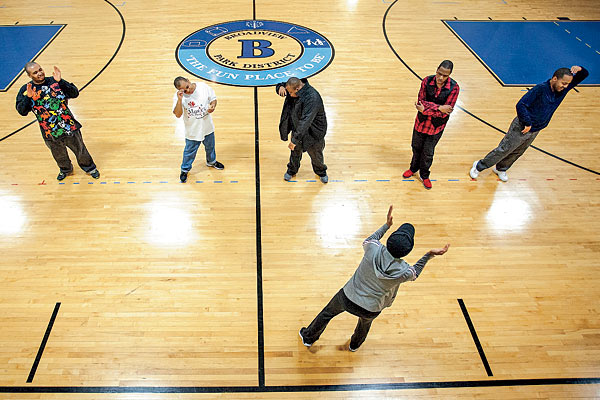
A dance and exercise class for young autistic adults in Broadview
One day in June 2011, Jane Gallery’s phone rang. The man on the other end introduced himself as Terry Kline. He had two autistic grandchildren who lived in Wheaton, he explained, and he had heard about Our Place. But it was an hour’s drive away. Did she know of anything similar in the western suburbs?
Gallery didn’t. But she issued Kline an invitation: Come to Wilmette and she would teach him what she had learned.
He jumped at the chance. Kline, 64, the retired CEO of a container manufacturer, is completely enamored of his grandchildren, Emma, 13, and Jack, 9. Emma was diagnosed with autism at 3, just as her mother learned she was pregnant with Jack. Emma was an aggressive toddler, but she has made great strides at Clare Woods Academy, a school for special-needs children in Bartlett. Jack is higher functioning.
After one particularly trying day, their mother, Sarah Donnelly, made a confession at her kitchen table that swiftly knocked Kline and his wife, Ginny, out of their retirement comfort zone. “It was one of those 24/7 days, and Sarah just looked at us and said, ‘I don’t know what we’re going to do when Emma turns 22 and ages out of services,’ ” remembers Kline. As a CEO, he was used to having answers. In this moment, he had nothing to say.
The Klines were determined to find a solution, and they wanted to give themselves a decade head start. “We visited all kinds of places and came to the conclusion that no one was talking about what was going on with [autistic] adults,” Kline says. “There are programs in DuPage County that have a recreational focus, so they fill gaps of time with outings and field trips, and they do fine programs. But we wished there was something more meaningful.”
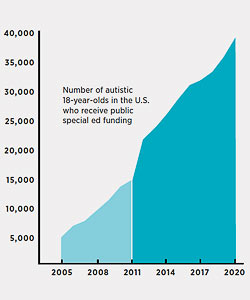
A LOOMING TSUNAMI: The number of autistic children hitting adulthood has zoomed over the past decade—and the wave will only grow in the next. NOTES: Data do not include children who were misdiagnosed, dropped out of school, or attended private programs. Therefore, the total number of autistic children in the U.S. turning 18 in any given year is higher than these numbers indicate. Numbers past 2011 are projections. SOURCES: U.S. Department of Education; Chicago estimates
“There aren’t many choices,” agrees Donnelly. “All we want are choices.”
That’s when Kline called Gallery. After her invitation, he made the trek to Wilmette nearly a dozen times to observe her in action. During his visits, Gallery warned him about the challenges that lay ahead if he wanted to open his own program. The myriad difficulties with securing public financing. (She advised him to adopt a private model.) The issue of finding permanent staff who are reliable. (A revolving door of part-timers is not optimal for autistic people, who find change difficult.) The problem of tracking down disabled adults once they age out of transitional programs. (“They drop out of sight,” says Gallery.)
Kline was undaunted. “People have said to me, ‘Why would you start a program at this [slow economic] time?’ ” he says. “I say, ‘The need is there.’ ”
And so last October, in the basement of a Presbyterian church in Wheaton, the nonprofit Connection of Friends opened its doors to 22 autistic and other special-needs young adults from several western suburbs. Its calendar recalls that of Our Place, with group conversation practice, guided exercise, lunch, art, music therapy, and community work. Volunteers come in to teach yoga and gardening. A low-lit quiet room with lava lamps and hand-sewn beanbag pillows offers a space where participants can go to relax if they feel anxious or angry or if they sense a seizure coming on.
Unfortunately, the amount paid by the families of those participants ($8 an hour) covers only a third of Connection of Friends’ expenses. The rest of its budget comes from foundation grants and private donations. So far, the Klines have poured in a considerable sum (Terry Kline declines to specify how much) to get the program up and running. They are planning three fundraisers this year to help bridge the gap.
When asked his ultimate goal for his grandchildren, Kline says that, quite simply, he wants them to have a place where they can make friends who understand their needs and struggles. Where they forge bonds that last after the organizers turn off the lights for the night. Maybe Emma or Jack could, one day, meet someone who would be a nice candidate for a roommate. Because the inevitable truth we all face—whether disabled or not—is that our parents (and our grandparents) won’t be around to take care of us forever.
“What makes a good life for anybody?” asks Jane Gallery. “Doing meaningful work, being engaged in their community, and making friends. We all want, and need, to have friends. I wanted to create an environment where my son would make friends. And he has. That’s why he is so happy now.”
Back on the North Shore, Frank Craven and the other members of the food pantry volunteer crew break down empty boxes, tidy up, and make their way to the van that will take them back to Our Place. Before Gallery switches off the light, she points out that the cans of peas are perfectly spaced.
* * *
WHERE TO FIND HELP
Five key resources for autistic adults or their guardians
ACCESS LIVING: The disability rights group can help autistic adults find community housing in Chicago and provides support for independent living. accessliving.org, 312-640-2100
THE ARC OF ILLINOIS: A nonprofit advocacy organization, it gives advice on navigating the state PUNS list and more. thearcofil.org, 815-464-1832
THE AUTISM PROGRAM OF ILLINOIS: This state-funded program maintains an online guide to financial and legal issues that autistic adults commonly face. theautismprogram.org, 217-525-8332
AUTISM SPEAKS: The nation’s largest autism advocacy organization hosts regular web chats for affected adults and their families. autismspeaks.org, 888-288-4762
EASTER SEALS METROPOLITAN CHICAGO: The charity’s local branch manages a vocational training program for adults with special needs; it offers free dental care to disabled adults, too. chicago.easterseals.com, 800-221-6827
Photography: Chris Lake


